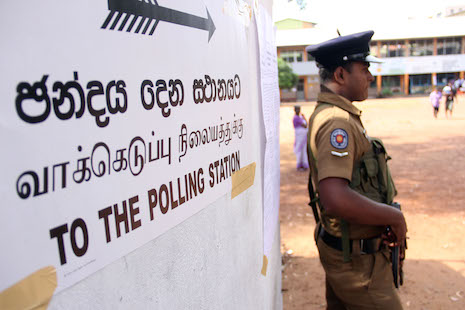Sri Lanka heads back to the ballot box
Reconciliation, treatment of ethnic and religious minorities are key issues

A police officer stands guard outside a polling station in Colombo Aug. 17. (Photo by ucanews.com)
- ucanews.com reporter, Colombo
- Sri Lanka
- August 17, 2015
Sri Lankans headed to the polls Aug. 17 for parliamentary elections that could have a major impact on the future of reconciliation in the often divided nation.
All eyes will be on the fortunes of Mahinda Rajapaksa, the country's divisive former leader who lost in Sri Lanka's January presidential election. However, Rajapaksa is now running for one of 225 seats in parliament, setting the scene for a political comeback just months after his defeat.
Rajapaksa is a controversial figure. In 2009, he presided over the defeat of Tamil guerrillas, putting a brutal end to a decades-long civil war. He remains popular among large sections of Sri Lanka's majority Sinhalese Buddhist community, but is generally distrusted by many Tamils and religious minorities.
Polls opened in the morning, with results not expected until Aug. 18.
Father Nandana Manathunga, a Catholic priest, said Sri Lankans were eager to exercise their democratic rights in this election.
"People vote against corruption, to give political rights to Tamil minorities and for true democracy in the country," Fr. Manathunga, director of human rights for Kandy Diocese, told ucanews.com after casting his vote Aug. 17.

People join a queue at a polling station in Mannar, in northern Sri Lanka, on Aug. 17. (Photo by ucanews.com)
As president, Rajapaksa resisted calls for accountability for war crimes that took place during the civil war. In particular, a United Nations panel estimates that as many as 40,000 Tamil civilians were killed in the final stages of the war.
The current president, Maithripala Sirisena, has vowed to make reconciliation a priority in his administration. However, observers say reforms have stalled in recent months.
This election, then, may offer a barometer on the reform process — and the popularity of former president Rajapaksa's Sinhalese Buddhist nationalist views.
"The … elections will test the continued appeal of the ex-president's hardline Sinhala nationalism and give a chance for the fresh start that lasting solutions to the country's social divisions require," the International Crisis Group said in a briefing Aug. 12.
Fr. Manathunga said reconciliation remains a vital issue in Sri Lanka.
"The Sinhalese majority has not understood the importance of reconciliation, but Catholics are very happy about the changes that happened in January," he said.
The chairman of the National Movement for a Just Society, Ven. Sobitha Thero, said the election is the beginning of an important journey for the country.
"Everybody should ensure a peaceful election," the monk said.
In an April report, the United Kingdom-based Christian Solidarity Worldwide warned of increasing rights violations since the end of the civil war. It drew particular attention to incidents of religious persecution, particularly against Muslim and Christian minorities.





No comments:
Post a Comment